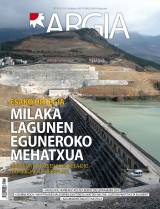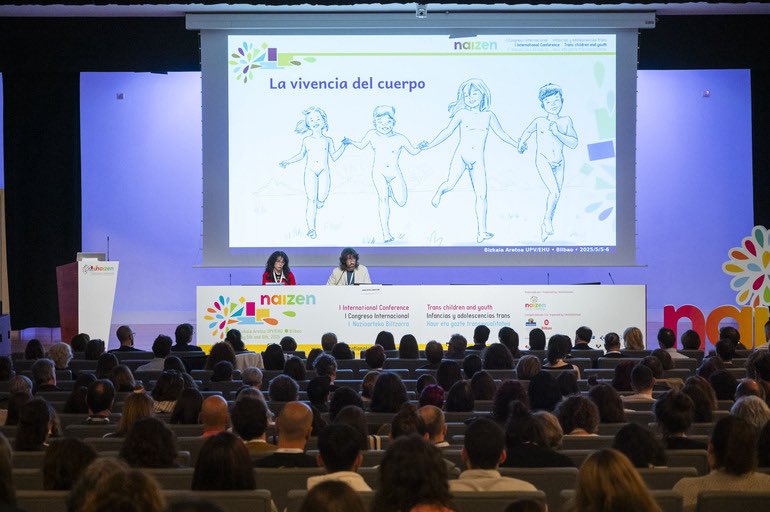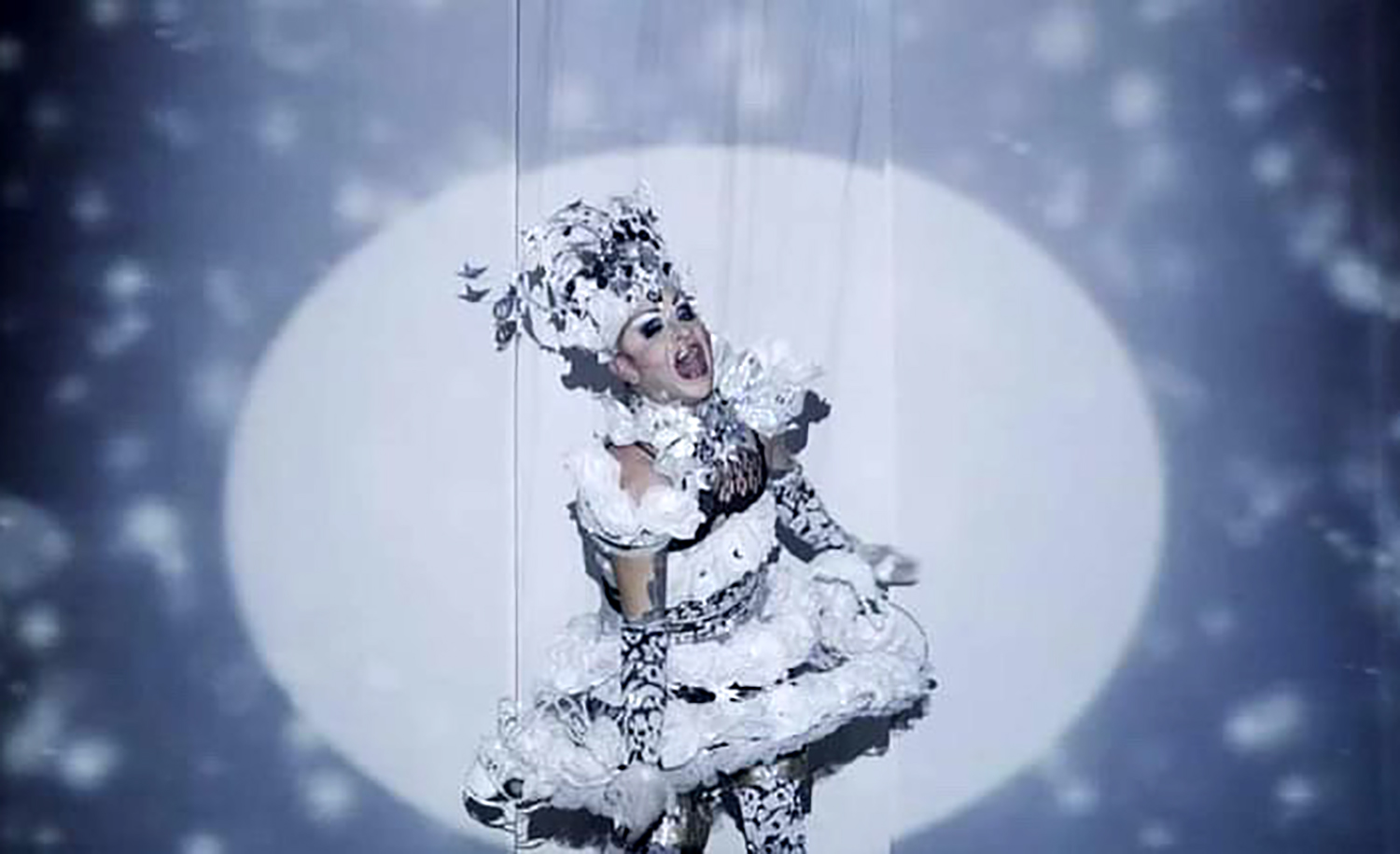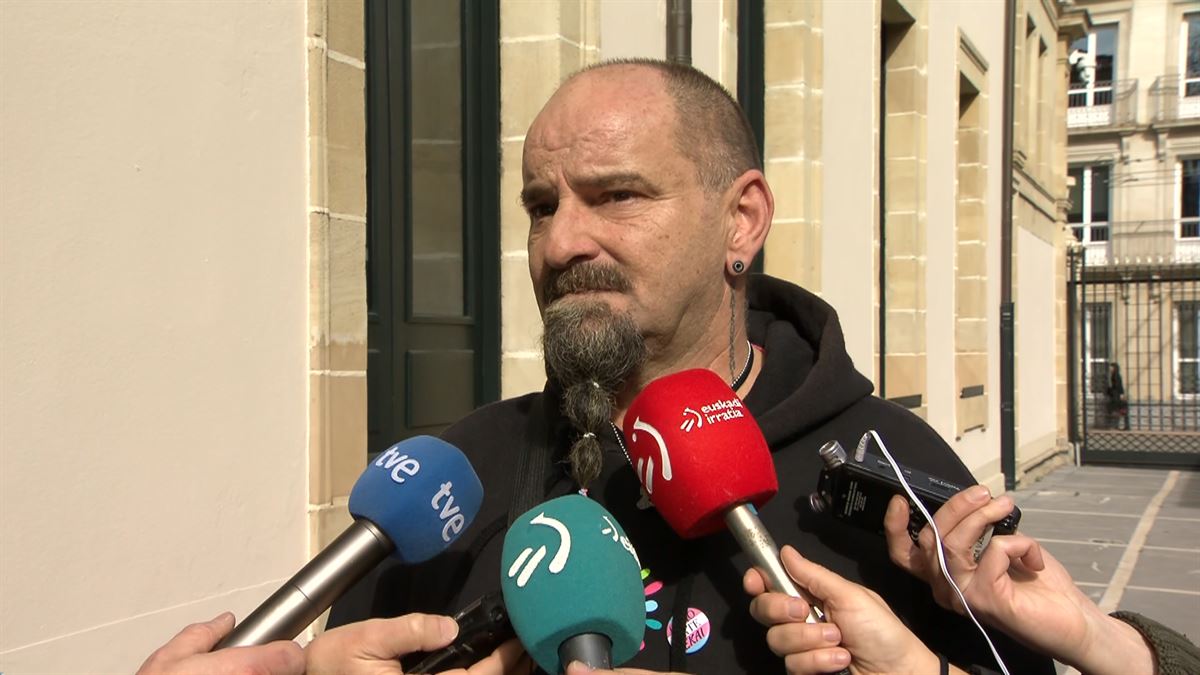"Transgender boys and girls are the first generation they are allowed to be what they are."
- He has been working for years as head of the UEU in Navarre, often against the trend, in favor of the values of this university. The Chrysallis Association has defended the rights of children in transsexual situations as their youngest.
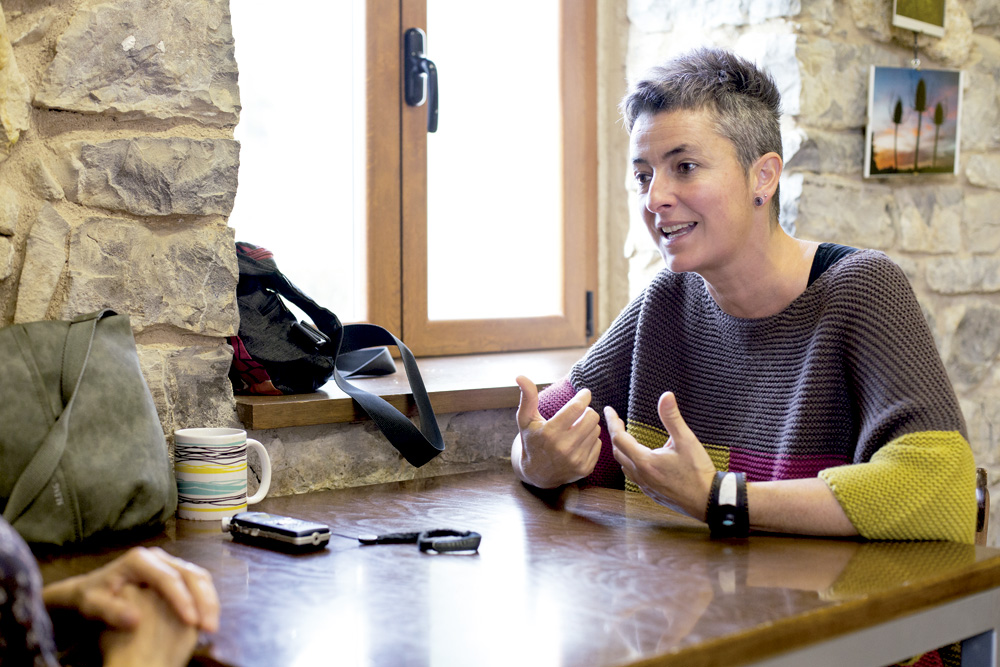
Duela hamaika urtetik Nafarroako UEUko arduraduna da, baina hori baino lehen argazkilari profesionala izan zen familiaren estudioan eta Euskaldunon Egunkarian. Nafarroako Basaburuko herri txiki batean bizitzea hautatu zuen. Hiru haurren ama da. Txikiena, zakila duen neskato bat da. Chrysallis Euskal Herria, transexualitate egoeran dauden haur eta gazteen familien elkarteko kidea da.
Do you have an old relationship with photography as a family, right?
Father, grandfather and great-grandfather were photographers. His great-grandfather moved to San Sebastian from Germany in 1898 and opened a photographic study. I chose to continue the business when my father had to leave it. I imagine that one of the four sisters had to take over and it was me.
So vocation or need?
I started studying at the Academy, but I didn't have a chance to learn the trade directly with my father, who became ill. But as a kid, I've learned how to look at my father's stuff. So all of a sudden, the burden of the business came upon me in just 19 years. Soon after I got the opportunity to work in Euskaldunon Egunkaria and worked for a while in both jobs, until the time came to choose one of the two. I decided to close the business because it was a burden to me. I learned the photographer's work as I did in the press. I was at ease in the early years, but then they came to the digital, put the role in the crisis, and that made photographers have incredible pressure. No fixed schedule, working on weekends, pressure, layoffs... unbearable. After eight years I left. I had a big personal crisis. I cut everything and came to Navarra. I fell in love with an imoztarra and came to live here.
How did he get to the EU?
After my first two children started studying, I saw an announcement for that job. They introduced me and welcomed me. It's been nine years. It is a very nice project.
The new winds for the UEU in Navarra now, right?
Huge change. In view of the situation of exclusion suffered by the EU and all Basque cultural activity in recent years, the current situation is tremendous. We've got the red carpet, subsidies, official receptions ...
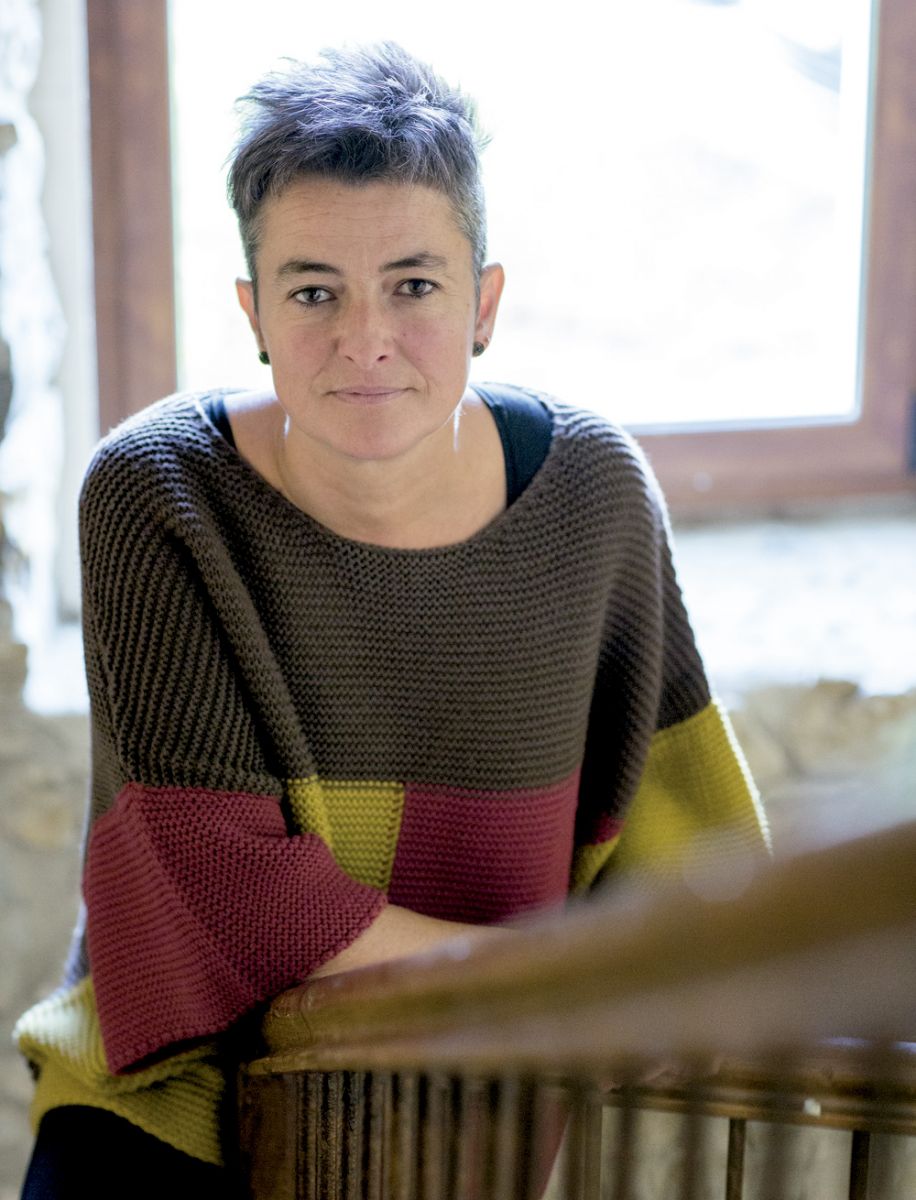
Have you had to endure a lot of ugly things?
This has been the policy form of the previous ones: they demonize everything related to Euskera. They have always treated us like the people of the CAV who come to invade Navarra. That "Que-arturo-los-Basques" has worked and continues to work.
I remember how the director of Euskarabidea, Xabier Azanza, repeatedly reproached us that in our contents reference was made to Euskal Herria.
The boycott has been so great that many people are getting to know it now in the UEU Navarra. We have been organizing courses for 40 years in Pamplona and fifteen in autumn and spring.
Why is the EU currently needed?
The main objective is the creation of a Basque university. This cannot be done politically today, because there is no firm decision to do so. In this situation, the UEU is committed to promoting collaboration with these universities that work in Spanish through the offering of courses and postgraduate courses in Basque, the creation of networks between the Basque scientific community and the production of university topics and their availability to society.
Thanks to the institutional support and publicity work that has been carried out, registration has increased five times over the last two years. He who knows the EU then goes on with him, because there is a need for training in Euskera.
Summer university, but working all year?
Moreover, the balance is now changing: before the main offer was summer, and now, on the other hand, the autumn and spring courses have gained a lot of strength.
After San Fermín, the UEU courses were one of the few initiatives that encouraged the harsh desert of Pamplona, but you have changed the date.
We have carried out the courses for two years at the end of June and we have achieved very good results. Another big change has been the transfer to the center. We cannot fail to change residence year after year. Now, at last, the Government of Navarre has offered us the Ezpeleta Palace, in the heart of Pamplona, on Calle Mayor. Change is going to be brutal.
“We wanted to give our children the opportunity to grow up in freedom, living in the small town of Aizcarpintero. We are very happy, even though we are paying in gasoline”
Being a mother of three children is not an easy task.
Educating the three children is certainly my most complicated task!
Why did you decide to live in a small town?
Because we wanted to give our children the opportunity to grow up in freedom. We're very happy, even though we're paying for gasoline. Here they come to find the sandwich at home and in the next few hours we don't see them. Boys and girls between the ages of 6 and 15 play, take care of themselves, do things, teach things… and unfortunately today you don’t see much in cities. I think the most important learning process is on the street.
I have been educated in another way, I am from the time when the child’s words were not heard and I have tried to convey to our children the opposite, with rules, of course, that are also necessary. And here the tempo is different, everything more rested. If they come from Pamplona, they feel relaxed and protected by nature. In the city there are always a lot of stimuli. Her eldest daughter says she wants to live here again for a few years, even if she's out. It's a joy.
You live in Aizarotz. What is special about that people?
The city council here a few years ago decided to attract young people. She propelled the Ernaizu women ' s cooperative, for example, so that women could work and live in it and created the village of Aizcarpintero. It was only four houses, which were in the hands of two families, and had made small and cheap to attract young people. Now it's a very young people. It's only two or three elders. We are 176 registered people, 58 of them minors. Many of those who have been looking for another philosophy to live, and we're working for the community, and we're focusing a lot of initiatives on it.

Her third child is BEÑAT, a six-year-old girl who has a penis.
Beñat has come to break all the schemes. She's a girl with a penis, but we weren't able to see her until she turned four. I will never forget the moment I was able to see. I broke dry. The boy spent two years telling us in different ways that we were wrong. It wasn't what we thought. He started talking very late and until then we were unable to understand his other messages. It made us completely change the way we understand the world. It's very powerful. Despite the struggle, Chrysallis is in the EH association, and from the very first moment, reaching out to Beñat and telling him that I'm next to him, he's being tough, I have the emotions on my skin.
Are there many children in this situation?
In the association we have more than 500 families in the Spanish state, 50 of them in the Basque Country. The Basque Association Herriko Elkartea was established in 2015 with eight families, so in two years we have grown enormously. Child transsexuality has been particularly taboo so far and we have come to break with that. They're the first generation in which they're allowed to be what they are and it's very big for the whole of society, because it puts us in the discourse of diversity. Adults in transsexual situations tell us that they lost their childhood because they were continually refuted; their suicide attempt rate is very high, scary. That's why it's important to socialize this reality.
In the association we have children of all ages, but as knowledge grows, more and more adolescents decide to take the step, understand their situation and dare. Adolescents bring a backpack of Christ, but once accepted and socialized, they can become happy.
Transgender boys and girls are being denied their identity on a daily basis. It's very hard. Most of them have an amazing personality, but others don't. Sometimes they give the impression that something is wrong creating problems. Some, for example, start to mutilate their genital organs. Fortunately, this is not our case. BEÑAT, President-in-Office of the Council. — (ES) Mr President, I should like to begin by congratulating Mr Beñat on his excellent report.
How did you find out that Beñat was a girl?
From a young age, she wore dresses, grandmother rings, as if a fabric had long hair on her head, she put on makeup, she painted her nails… The behaviors considered feminine took them to the end. Seeing that we accepted all of that, the child began to reject the kids' stuff, to take the kids away, to take away their father and their grandfather. I was beginning to show symptoms of anxiety and to have rabies attacks that were incomprehensible to us. She felt she didn't recognize her as she was, and when she started talking, she said she was a girl. We told him that yes, that would be what we wanted and that we wanted it the same, but we kept treating the boys. When we spoke in Spanish, we used the male article. With my gaze I transmitted to the child that I had a very female son and that I accepted him, but what he was looking for was not that. He was looking for recognition of his identity. Then he began to ask him every day: “Mom, am I a child?”
Bus Transfobo: “Those who say criticism and barbarity have not listened to our children and our families”
You started looking for information.
We knew something was happening, but we didn't know what. We started collecting information, and we found testimonies from other parents. So I saw it clearly. The next day, when he asked me: “Yes, you are a little girl. A girl with a penis and there are many more like you.” Suddenly I had an inner joy that I hadn't seen until then. Since then, he has not asked me again. I had my approval, and then he started looking for the whole family. The relationship with her father changed, with the boys at school, their concerns for joy disappeared. Most boys and girls follow the same patterns: attitudes that we consider very feminine or masculine take them to the extreme to make them see what they really feel. No one's going back. Beñat is very small and has achieved approval in time, but it is not usual, although we are willing to avoid suffering more and more we are fathers and mothers, there are still many who are rejected. According to the latest data, one in a thousand children were born in a situation of transsexuality.
What was the Chrysallis Association for you?
Chrysallis for me was clear. Thanks to them, I understood what I had at home. It is very difficult to break with everything. Because of social pressure, because of beliefs… many families have problems inside their homes. BEÑAT has had tremendous luck at birth in the place where he was born, in this family, in this small community and in this school. From here he will be 16 years old and by then he will have a very strong personality. Now we are constantly talking to everybody, giving explanations for Beñat to be accepted as a girl. For example, we aimed at swimming and we had to explain to everyone that she is a girl and that she is going to change in the girls' clothing. We want to grow like everybody else and not feel different. Suffice to know that she is the only girl with penis from the entire valley. Beñat is very small and knows nothing about the struggle we are waging. We, at least, want to be given respectful looks. We cannot ask everyone to understand, but we must ask everyone for respect. It is a very nice thing to work with children: we are all different and we all deserve the same respect.
What do you think about transfobas activities like the orange bus?
Ignorance leads to fears and then to phobias. Our job is to socialize the existence of this reality. Those who say criticism and barbarity have not listened to our children and our families. If they listened to the families' testimonies, they would behave differently.
Errepikatu nirekin: Sara Millerey. Ez dezagun ahaztu bere izena. Transfeminizidioaren biktima da Millerey: gorrototzaile transmisogino batek torturatu zuen, besoak moztu zizkion eta bizirik bota zuen ibaiertz batera. Bi orduko agoniaren ondoren hil zen.
Errazagoa da J.K... [+]









